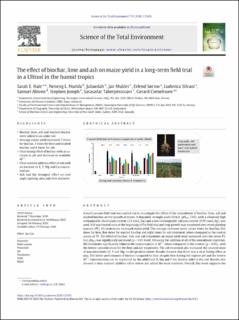The effect of biochar, lime and ash on maize yield in a long-term field trial in a Ultisol in the humid tropics
Hale, Sarah; Nurida, Neneng L.; Jubaedah, *; Mulder, Jan; Sørmo, Erlend; Silvani, Ludovica; Abiven, Samuel; Joseph, Stephen; Taherymoosavi, Sarasadat; Cornelissen, Gerard
Peer reviewed, Journal article
Published version

View/
Date
2020Metadata
Show full item recordCollections
- NGI articles [1061]
Original version
10.1016/j.scitotenv.2020.137455Abstract
A multi-season field trial was carried out to investigate the effect of the amendment of biochar, lime, ash and washed biochar on the growth of maize. A degraded, strongly acidic Ultisol (pHKCl 3.60), with a relatively high exchangeable aluminium content (2.4 cmolc/kg) and a low exchangeable calcium content (0.99 cmolc/kg), was used. Soil was treated once at the beginning of the field trial and crop growth was monitored over seven planting seasons (PS). All treatments increased maize yield. The average increases were; seven times for biochar, five times for lime, five times for washed biochar and eight times for ash treatment, when compared to the control across all PS. The effect of biochar, lime and ash treatments on maize yield were sustained over the seven PS. Soil pHKCl was significantly increased (p < 0.05 level) following the addition of all of the amendment materials. All treatments significantly reduced the concentration of Al3+ when compared to the control (p < 0.05), with the lowest concentrations for the lime and ash treatments. The ash treatment also increased the concentration of macronutrients (K, P and Mg) to the greatest extent. Results showed that there was a clear liming effect at play. The better performance of biochar compared to lime, despite lime having the highest pH and the lowest Al3+ concentration, can be explained by the additional K, Mg and P the biochar adds to the soil. Results also showed a clear nutrient addition effect where ash added the most nutrients. Overall, this work supports the fact that small scale farmers in Indonesia should produce biochar from their waste agricultural materials. Doing so not only provides an increase in crop productivity, but also sequesters carbon resulting in the best overall environmental benefit.